Heroes at their best and worst
David Crane
THE FLAME OF FREEDOM by David Brewer John Murray, £25, pp. 393, ISBN 0719554470 here can be few more dispiriting conflicts than the Greek war of independence. I suppose that the cruelty and factionalism that characterised it are endemic to every Balkan conflict, but the idea of Greek freedom and regeneration has invariably carried such associations and expectations in the Western imagination that from the first volunteer onwards the reality of it has always seemed uniquely dismal.
There are times, in fact, during the struggle which began in 1821, when you wonder by what stretch of the imagination it can be described as a war of independence at all. There were acts of obdurate courage and heroism, of course, but for the six years that ended with Navarino there were long periods when the only fighting was among the Greeks themselves, with faction taking on faction — islander against mainlander, the west against the east, Roumeli against the Peleponnese, the captains against the primates, senate against executive, phanariot against native — in a bewildering kaleidoscope of corruption, duplicity and greed that makes their final triumph the clearest evidence imaginable that God really was on their side.
It is not easy to describe a war that is as chaotic and shapeless as this one, and anyone who has ever looked at the original sources will recognise what an impressive job David Brewer has made of it. In the first decades after independence two superb histories of the conflict were written by Thomas Gordon and George Finlay, but although the memory of Byron has always guaranteed that philhellenism has got more than its fair share of attention, there has been a real need for an English account of the whole war as good as this one.
There is probably not much that is new here, but it has all the strengths of oldfashioned narrative history, with a strong sense of pace, a firm control of line, a confident handling of Greek and philhellene sources, a familiarity with the landscape, and a nice eye for detail. He begins with the various manoeuvres in and outside Greece that led to the opening shots of the war, and horror by horror takes the story through to Navarino and the assassination of Kapodhistrias, generous and understanding when the Greeks are at their worst and compellingly moving when — in such a heroic stand as at Missolonghi — they are at their best.
If there is a fault it is probably that this book is too soft on a Greek leadership that did everything it could conceivably do to lose this war, too ready to tiptoe around what David Brewer calls in his acknowledgments 'Greek susceptibilities'. The Greeks might be no different from any other country in clinging to national myths that bear little resemblance to reality, but in the 170 years since independence the hellenistic fantasies that still pass for history have had too profound an impact on their domestic and foreign policies to get as easy a ride as they do here.
David Brewer's answer to this criticism might well be that this is just another echo of the kind of wet philhellenism that sent so many volunteers scuttling back home at the first sight of a Greek battleground. He is probably right, too. The war was no more savage than that described by Goya and maybe less so than the liberation struggles in South America. There is no point, either, in railing against the klephts and captains who did the fighting because they were not what Westerners had imagined them to be. It is hard, though, to think that all those volunteers were wrong — Cochrane, Urquhart (a turcophile for life after fighting for the Greeks) or an idealist like the young Humphreys who ended up praying for battle in the desperate hope that at least some of his own side might get killed. Hard, too, to stand in the gorge outside Tripolis, where only rubbish marks the spot where 2,000 Turkish women and children were stripped and slaughtered, their heads cut off and swapped with those of dogs, and not wonder if the figure of Kolokotronis, his equestrian statue towering over the main square less than a mile away, is the ideal embodiment of nationhood.


































































 Previous page
Previous page